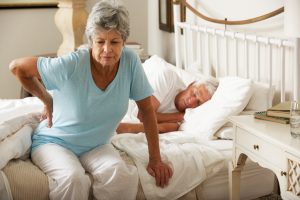
You may be experiencing morning stiffness if you are not physically active or overweight, if you have sleeping troubles, or if you live in a cold and damp area. Or, it can be a symptom of another condition that needs to be addressed, so again, no reason to assume that morning stiffness is just a part of getting old.
Why Do Joints Hurt Most in the Morning?
You would think that after eight hours of rest, your joints would feel better, but this prolonged period of stillness can actually increase stiffness. When we’re asleep, the fluid that keeps our joints lubricated is unevenly distributed in the joint space. As a result, some areas do not get properly lubricated, which can lead to stiffness.
In addition, while at rest, the joint cartilage soaks up this fluid, again resulting in decreased lubrication. On the other hand, when we are moving around, the fluid keeps lubricating the joints uniformly.
Conditions That Lead to Joint Stiffness
Arthritis is a common condition that affects the joints. There are many different types of arthritis, some stem from simple wear and tear of the joints, while other types are actually autoimmune conditions. Experiencing stiffness for an hour or more could be one of the first signs of arthritis.
The two main types of arthritis many of us are familiar with are osteoarthritis and rheumatoid arthritis.
In osteoarthritis, the cartilage between the two bones breaks down due to wear and tear. As a result, the bones rub together, and you experience pain and stiffness. Morning stiffness is quite severe, but as you carry on with your day, the pain somewhat decreases.
Rheumatoid arthritis is an autoimmune disorder in which the immune system starts attacking the healthy joints. This leads to inflammation and stiffness. In rheumatoid arthritis, stiffness can last for hours and, similarly to osteoarthritis, is usually worse in the morning.
If you’re concerned about your morning stiffness, you will want to check with your doctor. Morning stiffness, as mentioned, can be a sign of other health conditions, so the sooner you have yourself checked out, the sooner you will start feeling better.
How to Manage Morning Stiffness
There are some things you can do in order to reduce morning stiffness. These methods include:
Plan ahead
Have anti-inflammatory medications readily available on your nightstand along with a glass of water and some saltine crackers. Having these items so readily available means you can start reducing morning stiffness even before you get out of bed.
Complete exercises in bed
Before exiting your bed, complete some simple range of motion exercises with your hands, wrists, shoulders, and elbows. Gently move these body parts to begin to warm them up and increase mobility. Once your upper body is complete, work on your toes, ankles, knees, and hips.
Take a shower
A warm shower can be soothing for your muscles as heat boosts blood circulation, which is necessary to feel less stiff.
Warm up your clothing
You can put your outfit in the dryer for five minutes to warm it up a bit so that when you put it on, it offers some heat, which can boost circulation and reduce soreness.
Eat a good breakfast
A healthy breakfast helps give your body energy and fuel to help it function well throughout the day.
Use heat
Whether it be a heat pack or warming topical cream, using heat can help reduce stiffness.
Move daily
Regularly exercising and moving on a daily basis can help reduce the stiffness you experience every morning, because regular exercise keeps your muscles strong, which can better support your joints.
By implementing these tips into your daily routine, you may experience a reduction in morning stiffness, which can limit your abilities.
Also Read:
- Stiff Joints: Causes, Symptoms, and Treatment
- 10 foods to avoid for healthy joints
- 15 bone strengthening exercises for strong bones